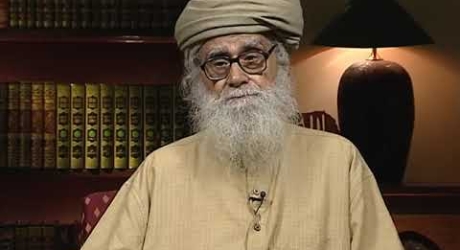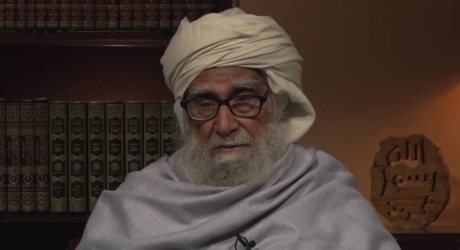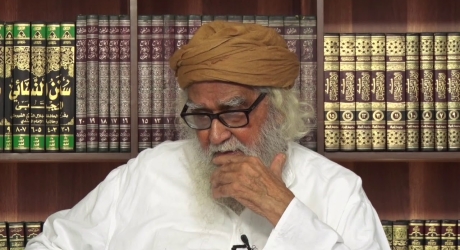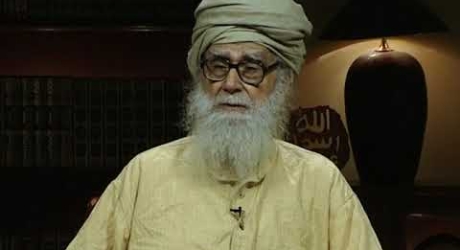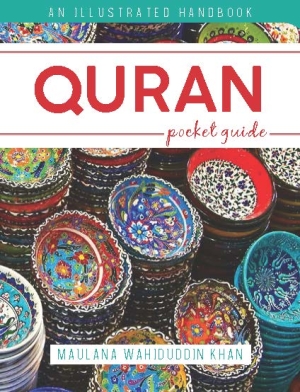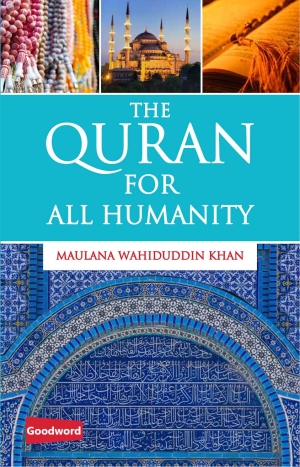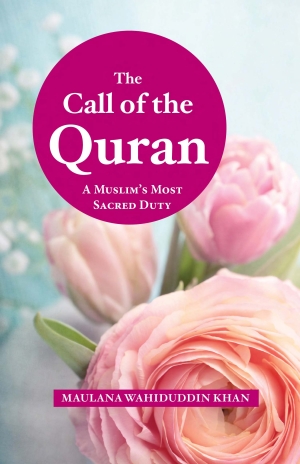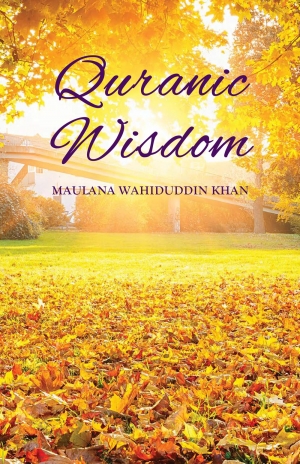The Quran is the Book of God. It has been preserved in its entirety for all time to come. Although written originally in Arabic, it has been made accessible, thanks to translations, to those who do not know Arabic. While no substitute for the original, translations serve the signal purpose of spreading the word of God far beyond the Arabic-speaking peoples to a far broader spectrum of humanity. A beginning to understanding the Quran can be made by reading the Quran. The Quran stresses the importance of man’s discovery of truth on spiritual and intellectual planes.
The Quran is apparently in the Arabic language, but in reality, it is in the language of nature, that is, the language in which God directly addressed all human beings at the time of Creation. This divine invocation of humanity is ever-present in the consciousness of all human beings; that is why the Quran is universally understandable—to some on a conscious plane and others at the subconscious level. This reality has been described in the Quran as ‘clear revelations in the hearts of those who have been given knowledge.’ (29:49) This means that the Divine Reality, explained by the Quran on a conscious plane, pre-exists in man subconsciously. The message of the Quran is not alien to man. It is a verbal expression of that same Divine Reality that aligns with man’s nature. One can read translations of the Quran to understand God’s message.
Featured Articles
Featured Videos
FAQs
The Quran is a book of God revealed to the Prophet Muhammad. It did not come to him in the form of a complete book but in parts over a period of 23 years. The first part was revealed in 610 AD when the Prophet Muhammad was in Makkah. Subsequently, different parts continued to be revealed regularly, the final part being revealed in 632 AD when the Prophet was in Madinah.
There are 114 chapters in the Quran, both long and short. The verses number about 6600. To meet the needs of recitation, the Quran was divided into 30 parts. These parts were finally set in order under the guidance of the Angel Gabriel, through whom God had revealed the Quran.
When the Quran was revealed in the first quarter of the 7th century, paper had already been invented. This paper, known as papyrus, was made by hand from the fibres of certain trees. Whenever any part of the Quran was revealed, it was written down on papyrus, or in Arabic, qirtas (6:7). During this process, people committed the verses to memory, the Quran being the only Islamic literature, which was recited in prayer, as well as being read out for the purposes of da‘wah. In this way, the Quran continued to be simultaneously memorized as well as written down. This method of preservation continued during the lifetime of the Prophet Muhammad. In this way, the Quran was preserved during the lifetime of the Prophet.
The third caliph, ‘Uthman ibn ‘Affan, had several copies prepared. He sent these to different cities, where they were kept in the great mosques. People not only recited from these copies, but also prepared more copies from them.
The writing of the Quran by hand continued till the printing press was invented and paper began to be manufactured on a large scale, thanks to the industrial revolution. Then, the Quran began to be printed. Printing methods went on improving and so the printing of the Quran also improved. Now printed copies of the Quran have become so common that they can be found in every home, mosque, library and bookstore. Today anyone can find a beautiful copy of the Quran, wherever he might be, in any part of the globe.
Source: Quran Pocket Guide
The Quran is a divine book, revealed specifically for the purpose of conveying glad tidings to humankind. This good news is that if man treads the path of good and of right action in the limited life of this world, he will find a place in eternal Paradise in the life Hereafter. The Quran makes it clear that these glad tidings of Paradise are meant only for the righteous:
“We have made it (the Quran) easy, in your own language, so that you may convey good news to the righteous.” (The Quran, 19: 97)
This good news is for those who adopt a God-oriented or righteous life in this world. Paradise is not to be the destiny of all and sundry, for it is only for the God-fearing (The Quran, 3: 133). It is to be given on a selective basis only to those who are deserving of it. To find a place in the ideal world of Paradise there is only one condition, and that is, being God-fearing or righteous.
Source: Spirit of Islam February 2017
The very language in which it is written—Arabic—is a kind of miracle, being an astonishing exception to the historical rule that a language cannot survive in the same form for more than 500 years. In the course of five centuries, a language changes so radically that the coming generations find it increasingly difficult to understand the works of their distant predecessors. For instance, the works of Geoffrey Chaucer (1342-1400), the father of English poetry, and the plays and poetry Of William Shakespeare (1564-1616), one of the greatest writers of the English language, have become almost unintelligible to twentieth-century readers, and are now read almost exclusively as part of college curricula with the help of glossaries, dictionaries and ‘translations.’
But the history of the Arabic language is strikingly different, having withstood the test of time for no less than 1500 years. Wording and style have, of course, undergone some development, but not to such an extent that words should lose their original meaning. Supposing someone belonging to the Quranic times of ancient Arabia could be reborn today, the form of language in which he would express himself would be as understandable to modern Arabs as it was to his own contemporaries.
It is as if the Quran had placed a divine imprint upon Arabic, arresting it in its course so that it should remain understandable right up to the last day. This being so, the Quran is never just going to collect dust on some obscure ‘Classical Literature’ shelf, but will be read by, and give inspiration to people for all time to come.
In the field of science, despite the great and rapid advances in knowledge in recent years, we come back to what was asserted in the Quran, so many centuries ago, as having arrived at the quintessence of the matter. Just as the Arabic language seems to have been crystallized at a particular point in time—in fact, at the moment of divine revelation, so also does science seem to have been arrested in its course, the Quran having the final say on matters which for centuries lay beyond man’s knowledge and which still, in many important cases, elude man’s intellectual grasp. The most significant of these is the origin of the universe.
Source: Quran: An Abiding Wonder
The Qur'an, the Book of God, enshrines the teachings which were basically the same as were to be found in previous revealed scriptures. But these ancient scriptures are no longer preserved in their original state. Later additions and deletions have rendered them unreliable, whereas the Qur'an, preserved in its original state, is totally reliable.
The Qur'an has 114 chapters. Its contents in a nutshell are: belief in one God, and considering oneself answerable to Him; firm belief that the guidance sent by God through the Prophet Muhammad is the truth and that man's eternal salvation rests thereon.
The position of the Qur'an is not just that it is one of the many revealed scriptures but that it is the only authentic heavenly book, as all other books, due to human additions and deletions, have been rendered historically unreliable. When a believer in the previous revealed scripture turns to the Qur'an, it does not mean that he is rejecting his own belief, but rather amounts to his having re-discovered his own faith in an authentic form.
The Qur'an is a sacred book sent by the Lord of all creation. It is a book for all human beings, because it has been sent by that Divine Being who is the God of all of us.
The Qur'an is no new heavenly scripture. It is only an authentic edition of the previous heavenly scriptures. In this respect, the Qur'an is a book for all human beings, of all nations. It is the expression of God's mercy for one and for all. It is a complete message sent by God for every one of us. The Qur'an is a light of guidance for all the world just as the sun is the source of light and heat for all the world.
Islam means submission. The religion of Islam is so named because it is based on obedience to God. A true believer in Islam is one who subordinates his thinking to God, who follows God's dictates in all aspects of his life.
Islam is the religion of the entire universe. For the entire universe and all its parts are functioning in accordance with the law laid down by God.
Such behaviour is also desired of man. Man should also lead his life as God's obedient servant just as the rest of the universe is fully subservient to God. The only difference is that the universe has submitted to God compulsorily, while man is required to submit to the will of God by his own choice.
When man adopts Islam, first of all it is his thinking, which comes under Islam, then his desires, his feelings, his interests, his relations, his loves and his hatred. All are coloured by his obedience to God's will.
When man, in his daily life comes under God's command, his behaviour with people, his dealings all are molded by the demands of Islam. From inside to outside he becomes a person devoted to God.
Man is God's servant, and indeed, the only proper way for man in this world is to live as the servant of God. Islam, in fact, is another name for this life of servitude to God. Where the Islamic life is devoted to the service of God, the un-Islamic life unashamedly flouts the will of God. Islam teaches man to lead an obedient life and surrender himself completely to the will of God. It is people who do so who will share God's blessings in the next world.
Source: Spirit of Islam December 2019





